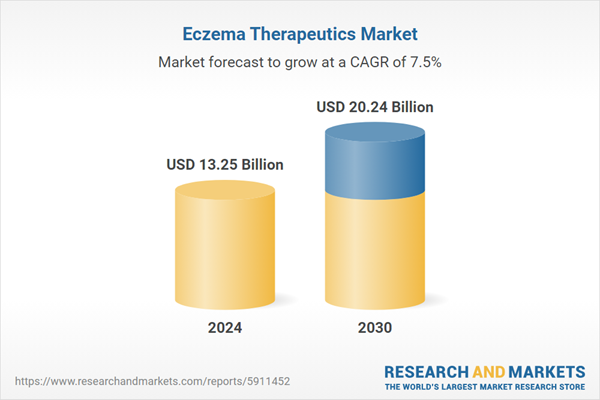Speak directly to the analyst to clarify any post sales queries you may have.
10% Free customizationThis report comes with 10% free customization, enabling you to add data that meets your specific business needs.
This market encompasses various products, including topical creams, ointments, oral medications, and biologics, designed to alleviate eczema symptoms and manage the condition. According to the National Eczema Association estimates that 31.6 million Americans have eczema, with cases expected to rise due to pollution, lifestyle changes, and chemical exposure. This growing prevalence is driving demand for effective treatments, fueling the expansion of the eczema therapeutics market. As more people seek relief, pharmaceutical companies are investing in innovative solutions to address this chronic skin condition.
Key Market Drivers
Rising Prevalence of Eczema
The most apparent way in which the rising prevalence of eczema boosts the growth of the eczema therapeutics market is through the expanding patient population. Eczema affects people of all ages, from infants to adults, and its incidence has been steadily climbing. This larger pool of potential patients translates into a growing demand for effective treatments, thereby driving market growth. For instance, according to the National Eczema Association reports that eczema affects over 30 million Americans, with a prevalence of 10%-20% in children and 2%-5% in adults, highlighting its widespread impact and the need for effective treatments across different age groups.As eczema continues to affect a greater number of individuals and families, awareness of the condition has risen significantly. Patients and their caregivers are increasingly seeking medical advice and treatment options. This growing awareness contributes to early diagnosis and intervention, fostering the adoption of eczema therapeutics and driving market expansion.
Eczema is a chronic condition that can significantly impact a person's quality of life. The constant itching, discomfort, and the potential for skin infections drive individuals to seek solutions that provide relief and long-term management. This demand for effective treatments encourages pharmaceutical companies and researchers to invest in the development of innovative therapies.
Key Market Challenges
Diverse Patient Population
One of the primary challenges faced by the eczema therapeutics market is the diverse nature of the patient population. Eczema can manifest differently in individuals, with varying triggers and severity levels. Tailoring treatments to the specific needs of each patient can be complex and requires a personalized approach. Pharmaceutical companies are increasingly investing in research to address this challenge by developing more targeted therapies.Key Market Trends
Biologic Therapies Revolutionizing Treatment
Biologic drugs have already made a significant impact on the eczema therapeutics market, but their potential is far from exhausted. In the coming years, we can expect to see the development of more targeted and efficient biologics that offer even better results with fewer side effects. These innovative therapies are likely to become more accessible to a broader range of eczema patients.Key Market Players
- Sanofi SA
- Encore Dermatology Inc.
- AbbVie Inc.
- F Hoffmann-La Roche AG
- Novartis AG
- Regeneron Pharmaceuticals Inc.
- Astellas Pharma Inc.
- GSK PLC
- AstraZeneca PLC
- Pfizer Inc.
Report Scope:
In this report, the Global Eczema Therapeutics Market has been segmented into the following categories, in addition to the industry trends which have also been detailed below:Eczema Therapeutics Market, By Treatment:
- Antibiotics
- Antihistamines
- Calcineurin Inhibitors
- Corticosteroids
- Emollients & Moisturizers
- Immunomodulators
- Interleukin Inhibitors
Eczema Therapeutics Market, By Distribution Channel:
- Hospital & Clinics
- Online Pharmacies
- Retail Pharmacies
Eczema Therapeutics Market, By Region:
- North America
- United States
- Canada
- Mexico
- Europe
- Germany
- United Kingdom
- France
- Italy
- Spain
- Asia-Pacific
- China
- Japan
- India
- Australia
- South Korea
- South America
- Brazil
- Argentina
- Colombia
- Middle East & Africa
- South Africa
- Saudi Arabia
- UAE
- Kuwait
Competitive Landscape
Company Profiles: Detailed analysis of the major companies present in the Global Eczema Therapeutics Market.Available Customizations:
With the given market data, the publisher offers customizations according to a company's specific needs. The following customization options are available for the report.Company Information
- Detailed analysis and profiling of additional market players (up to five).
This product will be delivered within 1-3 business days.
Table of Contents
Companies Mentioned
- Sanofi SA
- Encore Dermatology Inc.
- AbbVie Inc.
- F Hoffmann-La Roche AG
- Novartis AG
- Regeneron Pharmaceuticals Inc.
- Astellas Pharma Inc.
- GSK PLC
- AstraZeneca PLC
- Pfizer Inc.
Table Information
| Report Attribute | Details |
|---|---|
| No. of Pages | 186 |
| Published | March 2025 |
| Forecast Period | 2024 - 2030 |
| Estimated Market Value ( USD | $ 13.25 Billion |
| Forecasted Market Value ( USD | $ 20.24 Billion |
| Compound Annual Growth Rate | 7.4% |
| Regions Covered | Global |
| No. of Companies Mentioned | 10 |









